While the world’s foremost scientists continue to explore the unknown, contributing hours of research the technological advancements, the filmmaking industry has artistically and scientifically provided us with a brief insight in the spaceships, Unidentified Flying Objects and alien motherships.
Since the 1950s, several directors have successfully enthralled audiences with their imaginative incarnation of the idea. It’s imperative to understand that this list is about “UFOs” and not aliens, as there’s a separate list for that. The movies on this list focus primarily on the spaceships and are they relevant to the story. So, without further ado, here’s is the list of top films about UFOs ever. You can watch some of these best UFO movies on Netflix, Hulu, or Amazon Prime.
8. Flight of the Navigator (1986)
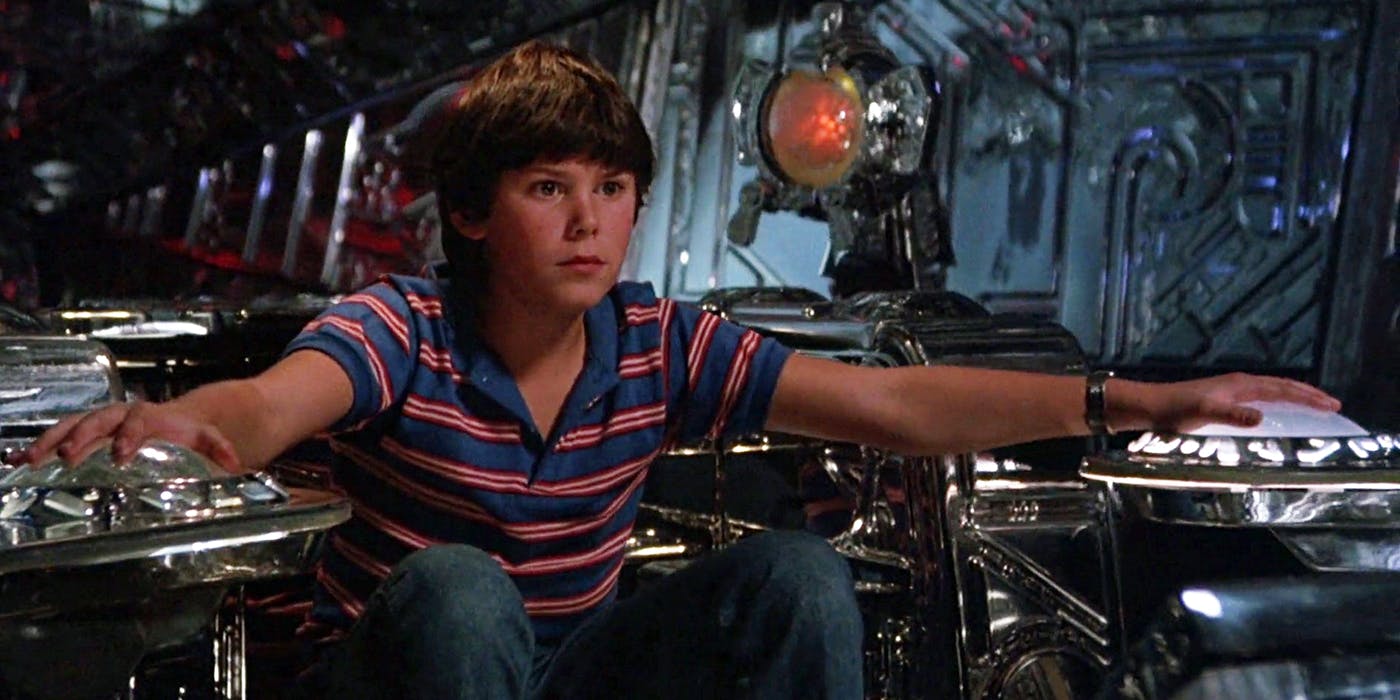
Directed by Randal Kleiser, ‘Flight of the Navigator’ follows Joey Cramer as David Freeman, who in 1978, travels 8 years into the future and has an adventure with an intelligent, wisecracking alien ship. Classified as a “science fiction adventure” film, ‘Flight of the Navigator’ is a quintessential family film. While the other films utilise the fear of the unknown, this 1986 flick brings forth a child’s excitement of the new world.
Conceived by Mark H. Baker and written by Michael Burton and Matt MacManus, the film is a light-hearted take on the scientific advancement of the alien world. A favourite among children and a classic of the 80s, ‘Flight of the Navigator’ went on to bag 3 nominations at the Academy of Science Fiction, Fantasy & Horror Films and has spawned a remake, which is to be produced by Lionsgate and The Jim Henson Company.
7. The War of the Worlds (1953)
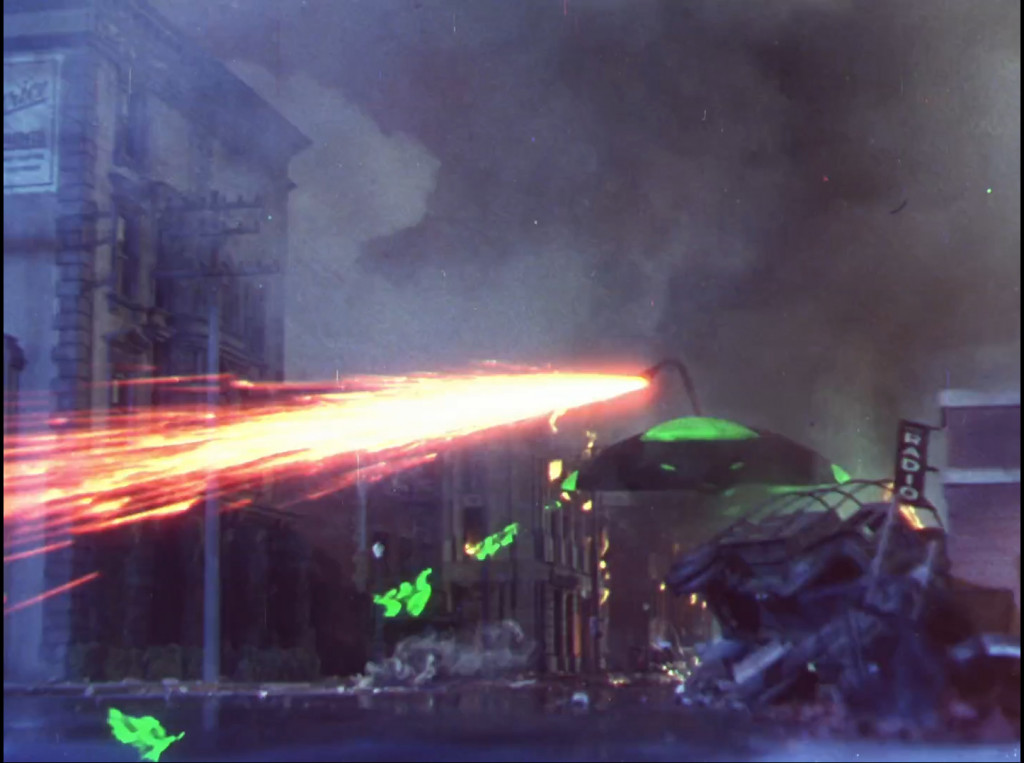
An adaptation of H. G. Wells’ ‘The War of the Worlds’, published in 1898, this 1953 movie revolutionised the UFO-oriented films. Tracing the yet un-researched alien life on Mars, the film follows a small town in California which is attacked by Martians, beginning a worldwide invasion.
Directed by Byron Haskin, the film is a commentary upon the Cold War and the deploring humanity, amidst their obsession of advancing in science and technology. Winning won an Academy Award for “Best Visual Effects”, the film essentially paved the way for directors such as Steven Spielberg, Ridley Scott and David Cameron to explore the “other” world. While Spielberg’s 2005 science fiction film ‘War of the Worlds’ was an authentic adaptation of Wells’ novel, Haskin’s Technicolor flick prove to prevail among critics and audiences alike.
6. Signs (2002)

Starring Mel Gibson and Joaquin Phoenix, the 2002 film is a science fiction horror film about a family living in a farm which finds mysterious crop circles or “signs”. Little is known that these signs signify an impending peril. ‘Signs’ was both a commercial and critical success, with it receiving quite a many accolades. Releasing at a time when director M. Night Shyamalan was at the top of his game, ‘Signs’ provides the deduction of how the alien life might affect Earth and its unexplored horrors.
Shyamalan’s film is all the more accentuated by James Newton Howard’s musical score and the cinematography Tak Fujimoto infuses the backdrop of the rural human environment and the yet unfamiliar extra-terrestrial life. The film focuses on the UFO and exploits its resulting fear without fixating on the alien life. While the film was met with some flak for Shyamalan’s decision of divulging all suspense built through the course of the narrative by the end, his elaborate direction and the exploits of the UFO for highly appreciated by critics and audiences alike.
5. Independence Day (1996)
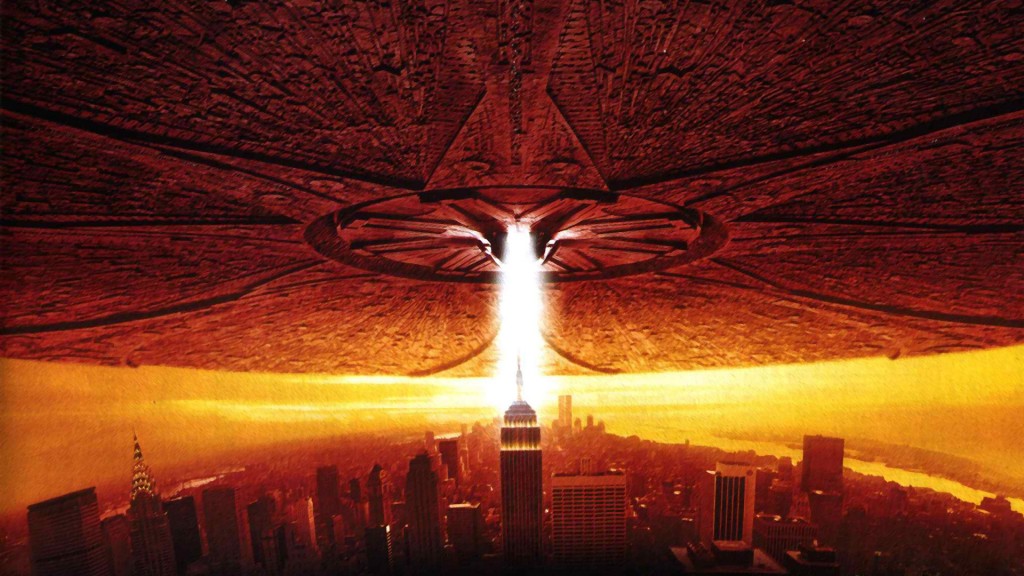
Considered as one of the most important films in the history of the “Hollywood Blockbuster”, ‘Independence Day’ resurfaced the science fiction genre, which saw a scathing decline in popularity due to the poorly written, acted and directed flick of the 90s. Directed by Roland Emmerich, the film focuses on an alien invasion which threatens all humanity. Reiterating America’s fight against the alien life, the title marks their attempts to gain “independence” from the clutches of the extern-terrestrial life by July 4 – the independence day of America.
While the film receives quite a criticism for its nationalistic overtones, which is quite evident for the summary, the innovative take on the sci-fi genre elevated the film from any criticism whatsoever. ‘Independence Day’ explores the technological superiority of the extra-terrestrial, described as an “alien mothership”, with dexterity. Starring Will Smith as Captain Steven Hiller, a Marine F/A-18 pilot and Jeff Goldblum as David Levinson, an MIT-educated technological expert, the film took a detour from the clichéd approaches towards the concept of an alien life. The films of the genre, regardless of its brilliance, had stagnated due to the repetitive elements of horror and fear. However, the alien life and their terrifying power are set in parallel with the quintessential comedy of the “buddy-comedy” genre.
Read More: Best Alien Movies
4. Arrival (2016)
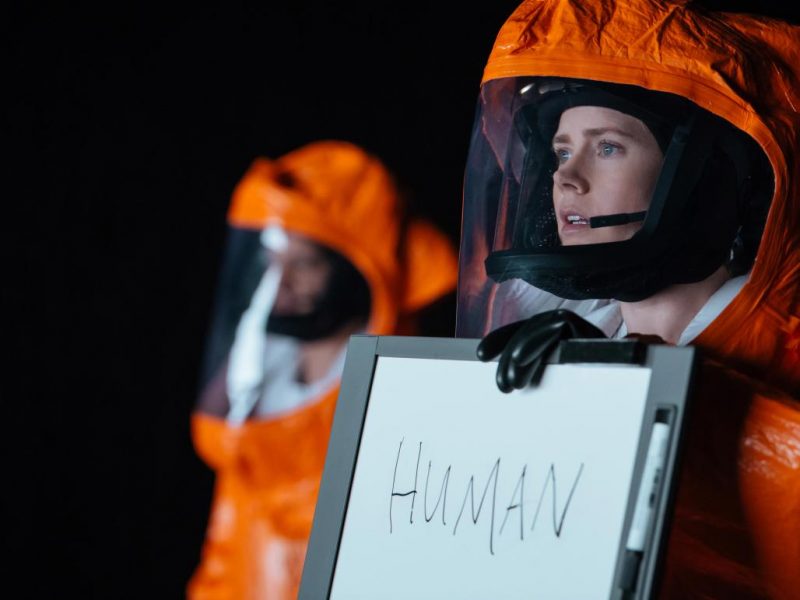
With a cohesive screenplay and mature performances by the lead cast, ‘Arrival’ is a brilliantly directed science fiction film. Directed by Canadian filmmaker Denis Villeneuve, ‘Arrival’ follows linguist Louise Banks, essayed by Amy Adams, who is recruited by the military to communicate with alien life-forms after twelve mysterious spacecrafts land around the world. This 2016 film enthrals audiences with its philosophical inferences and allegories on life, humanity and existence.
Based on the short story ‘Story of Your Life’ by Ted Chiang, published in 1998, the Academy Award-nominated screenplay is luminously adapted by Eric Heisserer. The incandescent talent of the crew earned ‘Arrival’ the rare distinction of being nominated in the “Best Film” categories at the Academy Awards and BAFTA, and was cited as being the best science fiction movie of 2016 by various scientific institutions.
3. Close Encounters of the Third Kind (1977)
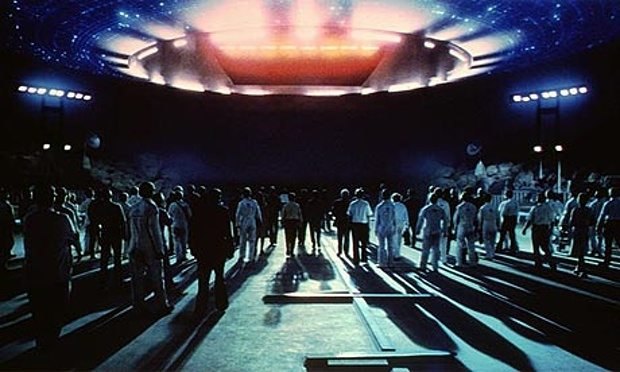
Directed by the visionary Steven Spielberg, ‘Close Encounters of the Third Kind’ is the story of Roy Neary, an everyday blue-collar worker in Indiana, whose life changes after he tries to follow a series of psychic clues to the scheduled meeting between representatives of Earth and visitors from the cosmos. A dream project for the director, the film is a development of American Ufologist J. Allen Hynek’s classification of close encounters with aliens, in which he said that third kind denotes human observations of aliens or “animate beings”.
Like the aforementioned ‘Independence Day’ on this list, ‘Close Encounters with the Third Kind’, alongside ‘Star Wars’ (1977) and ‘Superman‘ (1978), led to the re-emergence of the “science fiction” genre. With visionary visual effects and the pictorial cinematography by Vilmos Zsigmond, the movie uses the idea of a spaceship, a concept hardly read by the audience. With its uncertainty and ambiguity of the technological advancements of the third kind, the film was a breath of fresh air to critics and audiences.
2. Alien (1979)
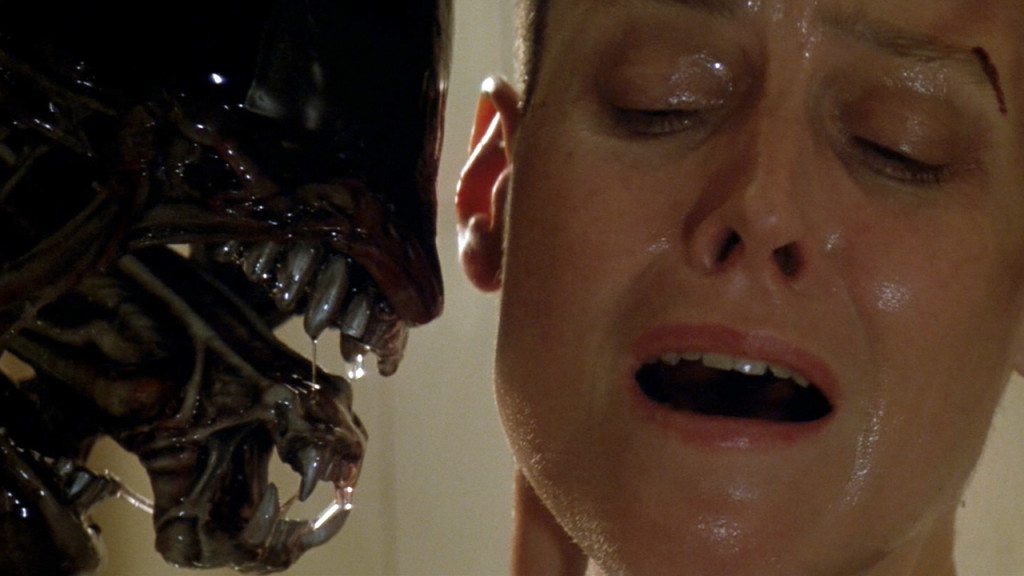
‘Alien’ is a conclusive proof that alien life is not supposed to be explored. Conceived by Dan O’Bannon and Ronald Shusett, ‘Alien’ is the story about a man-hunting extra-terrestrial creature that stalks and attacks the crew of a spaceship. A science fiction film, this 1979 flick embraces the horror of the unknown with terrifying warmth. Preserved by the Library of Congress, the film set a benchmark for the horror genre which still hasn’t been surpassed. ‘Alien’ is brilliantly symbolical, amalgamating the classic mystery of the fear and an unpleasant social construct.
Directed by Ridley Scott, this sci-fi horror film is vividly visual, intensifying the inner fear of the human and fear of a grotesque reality. While the aforementioned man-hunting alien is set as the primary character, the film utilizes the murkiness of the spaceship where the mysterious life form takes birth as an active character. The production design, which won the BAFTA for “Best Production Design” and a nomination for an Academy Award and the intricate direction by Scott, creates a foggy claustrophobic effect, causing intense discomfort and unease. Winning the Academy Award for “Best Effects, Visual Effects”, ‘Alien’ was met with immense critical praise and commercial success, and has since been regarded as one of the greatest science fiction movies of all time.
1. 2001: A Space Odyssey (1968)
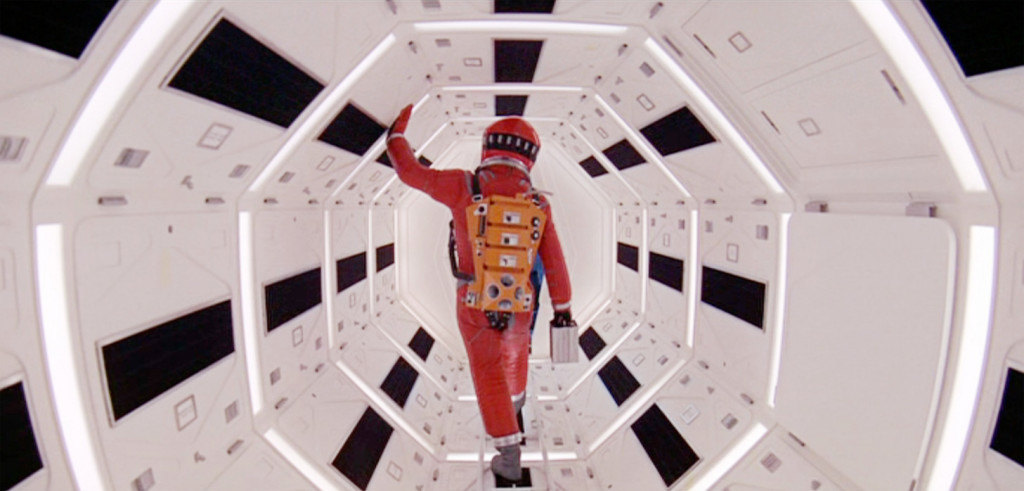
An enigma of a film, ‘2001: a Space Odyssey’ follows a voyage to Jupiter with the sentient computer HAL after the discovery of a mysterious black monolith affecting human evolution, deals with themes of existentialism, human evolution, technology, artificial intelligence, and the existence of extra-terrestrial life. Directed by the eccentric Stanley Kubrick, the film is a terrifying yet an intoxicating watch.
Adapted from British author Arthur C. Clarke’s short story’ The Sentinel’ (1951), who also assisted in writing the screenplay, the film utilises the ambiguity of the extra-terrestrial life form. While the other movies on this list heavily rely on the terror of the spaceship, this 1968 wonder develops the horror without actually showing it onscreen. What makes this film such a tremendous watch is its scientific accuracy, a feat still unmatched by many. Adding to its grandeur, the employment of classical music and minimalist dialogues elevated the discreet horror and opacity.
Like any visionary masterpiece, the film wasn’t a critical success at the time of its release. However, with the passage of time, ‘2001: A Space Odyssey’ has seasoned to be one of the greatest science-fiction films of all time. Not surprisingly, ‘2001: A Space Odyssey’ nabbed the Academy Award for “Best Effects, Special Visual Effects” and the BAFTA for “Best Art Direction”, “Best Cinematography” and “Best Sound Track”.
Read More: Alien Movies on Netflix


You must be logged in to post a comment.